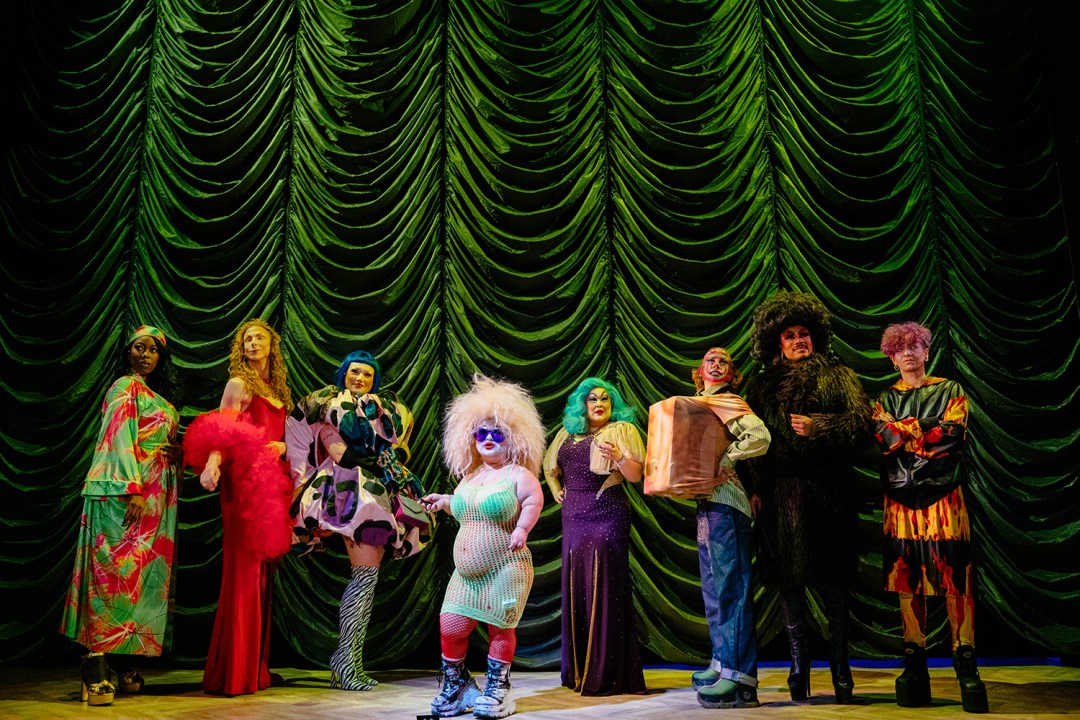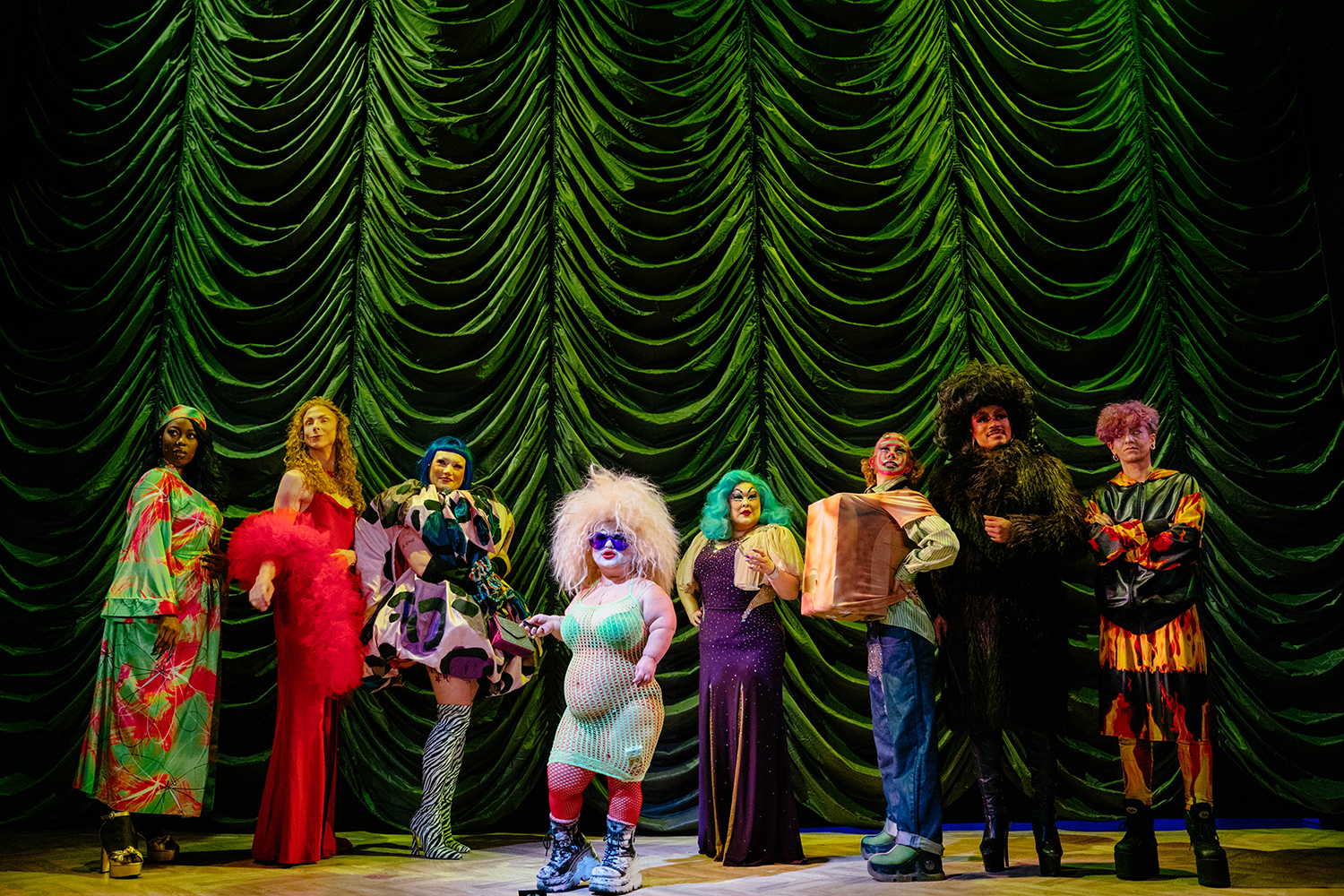Sound of the Underground is a drag show involving a handful of cross-dressers who spend the opening 15 minutes telling us who they are. Then, rather ominously, they announce: ‘We’ve written a play.’ But they haven’t really. The scene shifts to a kitchen where the drag queens meet to discuss their pay and conditions, and the show turns into an advertisement for their woes.
Drag is facing a crisis, we hear, caused by its sudden popularity. Drag queens are in demand from TV bosses and corporate executives but the artistes feel dismayed and traduced by this surfeit of opportunity. They loathe RuPaul, a cross-dresser favoured by the BBC, and they blame him for betraying the true spirit of drag, whatever that may be. One of them calls RuPaul ‘exclusionary’. They share an abiding contempt for their most loyal customers, female hen parties, whom they accuse of ‘loving bingo’ and ‘vomiting prosecco’. And though they seem good-natured, the drag queens haven’t a clue how banal their problems are. Anyone who turns a pastime into a career will notice a sharp diminution in its charm and spontaneity.
Money obsesses them. They moan about their £600 weekly wage from the Royal Court (more than a commercial producer would offer them), and they pass buckets around the stalls, begging for tips. No one warned them that scrounging from the audience will encourage the management to pay them less, not more. Some of their suggestions sound insane but are likely to materialise as the cult of diversity spreads. One of the queens wants the profession regulated by the state, like teaching or medicine. A black artiste cites ‘racial othering’ and proposes the creation of ‘our own spaces’. Apartheid, in other words. It’s not inconceivable that cross-dressing will become a nationalised industry with quotas imposed on the public sector. We’ll have drag surgeons, drag sewage inspectors, drag coroners, drag air-traffic controllers. All on minimum salaries with paid leave and protected pensions.
Though they seem good-natured, the drag queens haven’t a clue how banal their problems are
Not that the artistes will be satisfied. Drag queens are natural outsiders whose lifestyle is based on their rejection of conformity, so it’s bizarre to hear them clamouring to be treated like the suburbanites whose culture they despise. Drag appears to be the latest casualty of woke activism which is defined by the permanent disillusionment of its followers. The artistes have a long list of demands but their essential gripe is easy to spot: they want more than they’ve got now. It’s pointless giving such people the treats they ask for because what they really crave, deep down, is to feel victimised for ever.
Picasso is a monologue by Terry d’Alfonso (a female writer) who takes the Spanish maestro at his own estimation. He’s a genius, a titan, a magician, a god. He’s as potent as the sun and as iconic as the minotaur. The artist states his exceptionality again and again but he never lets us know what lies behind his boastful self-absorption. His chief hobby is seducing dollybirds which he does effortlessly but without reflection or self-awareness. Younger play-goers will find him profoundly misogynistic as he announces that any woman who gets close to him will be destroyed.
The timeline of the play is a puzzle. One minute he’s a famished youngster in Paris, burning old sketch pads for warmth. A little later, he’s a 70-year-old celebrity juggling an ex-wife and a pregnant mistress while eyeing up future conquests. You need to research Picasso in advance to make sense of this. And one wonders if he was truly as pretentious and self-deceiving as the script suggests. He tells us that his scruffy doodle, ‘Guernica’, helped to combat fascism for years. But it’s a layer of paint on a strip of cloth. To defeat the Nazis you need soldiers and tanks, not an oblong canvas covered in squiggles.
The visuals of the play fail to match up to Picasso’s self-image as a world-conquering divinity. Actor Peter Tate wears a paint-flecked shirt and stands beside a cheap ladder as if he were a house decorator with a sideline in seducing housewives. This could be Confessions of a Window-cleaner with A-levels. The action is intercut with filmed clips of Tate, who looks about 60, ogling young beauties in the bath. Pervy conduct like that was acceptable in Picasso’s day when women had few opportunities to better themselves and the attentions of a fat, bald millionaire were considered a blessing. Even a talented beauty like JFK’s widow bedded a rich toad. Nowadays it looks repugnant. The actor adds flourishes for which Picasso is not renowned. He sings lines from folk tunes and shimmies his pelvis in a pastiche of flamenco dancing, like an X-Factor wannabe. You can almost hear Simon Cowell giggling.
Picasso’s life would make a fascinating subject but this is an overpolished statuette rather than a living, breathing portrait of a human being.








Comments